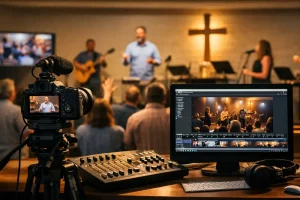Introduction: In an era where digital communication and multimedia have become integral parts of our daily lives, churches are increasingly recognizing the importance of harnessing the power of media to enhance their ministry. The advent of media ministry has not only transformed the way churches communicate but has also opened up new avenues for outreach, worship, and community engagement. In this blog, we’ll explore the significance of media ministry in the church and how it can contribute to the spiritual growth of the congregation.
1. Broadening the Reach: In a world connected through screens and social platforms, media ministry serves as a potent tool for extending the reach of the church beyond its physical walls. Live streaming services, podcasts, and video content enable the congregation to connect with the message of the gospel from virtually anywhere. This broadened reach allows the church to impact not only its local community but also individuals around the globe.
2. Enhancing Worship Experiences: Media ministry has revolutionized the way worship is conducted within church walls. Visual aids, such as projection screens and multimedia presentations, add depth and richness to worship services. Whether through worship lyrics, inspirational videos, or dynamic presentations, multimedia elements create a more immersive and engaging worship experience, fostering a deeper connection between the congregation and the divine.
3. Educational Opportunities: Media ministry goes beyond the sanctuary to provide educational resources for the congregation. Online platforms, social media, and podcasts serve as channels for delivering sermons, Bible studies, and educational content. These resources empower individuals to continue their spiritual growth throughout the week, allowing them to delve deeper into the teachings of the Bible and fostering a culture of continuous learning.
4. Community Building: Social media platforms and church websites facilitate community building by providing spaces for members to connect, share, and support one another. Online forums, discussion groups, and virtual events create opportunities for the congregation to build relationships beyond the confines of the church building. This sense of community fosters a supportive environment where individuals can grow spiritually and find encouragement in their faith journey.
5. Effective Communication: Media ministry plays a crucial role in enhancing communication within the church. Newsletters, announcements, and event promotions can be disseminated quickly and efficiently through various digital channels. This ensures that the congregation is well-informed about upcoming events, volunteer opportunities, and important updates, promoting a sense of unity and involvement.
6. Evangelism and Outreach: Leveraging media for outreach initiatives allows the church to connect with individuals who may not have otherwise stepped through its doors. Social media campaigns, online evangelistic events, and digital content sharing enable the church to spread the message of hope and love to a wider audience, effectively fulfilling the Great Commission in the digital age.
Conclusion: In a world where media consumption is an integral part of daily life, the incorporation of media ministry in the church is not just a modern convenience but a strategic and impactful approach to ministry. By embracing digital tools and multimedia platforms, churches can enhance their outreach, provide enriching worship experiences, and build a strong sense of community among their members. As technology continues to advance, media ministry will undoubtedly play a pivotal role in shaping the future of church engagement and spiritual growth.








